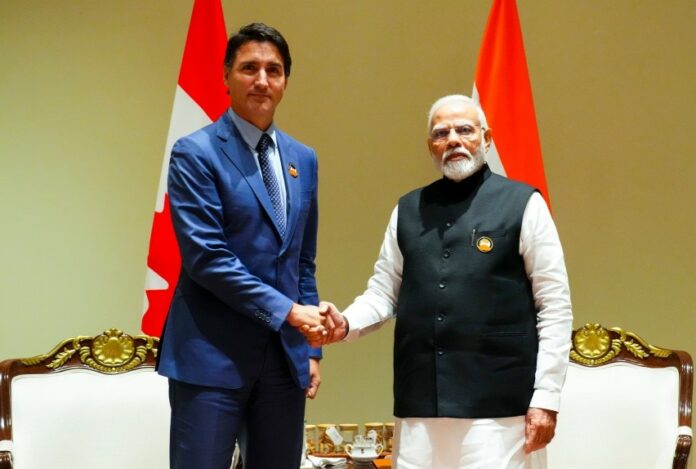Who will lose in this diplomatic standoff? Indo-Canadians who travel to India for routine businesses and leisure, international students whose visas are pending, plus businesses involved in trade will be hard-hit, according to experts.
India and Canada’s relations have been strained time and again over various issues. But this week witnessed the worst-ever diplomatic stand-off between the two countries after Prime Minister Justin Trudeau stood up in the House of Commons to accuse the government of India of involvement in the fatal shooting of a Surrey Gurdwara President Hardeep Singh Nijjar.
“Canadian security agencies have been actively pursuing credible allegations of a potential link between agents of the Government of India and the killing of a Canadian citizen, Hardeep Singh Nijjar,” Trudeau said Monday in a speech to the House of Commons.
“Any involvement of a foreign government in the killing of a Canadian citizen on Canadian soil is an unacceptable violation of our sovereignty. It is contrary to the fundamental rules by which free, open and democratic societies conduct themselves.
Everyone knew that there would be ripple effects after PM Trudeau’s bombshell revelation, but it was unexpected for the two countries’ relations to become extremely sour.
While many Sikhs commended PM Trudeau for his bold stand and politicians including BC Premier David Eby, Surrey Mayor Brenda Locke issued statements against foreign interference, many people of Indian origin were concerned about the effects of the escalating confrontations on their daily lives.
India, on the other hand, dismissed the accusations as absurd, and said the expulsion came amid “growing concern at the interference of Canadian diplomats in our internal matters and their involvement in anti-India activities,” according to a statement from its Ministry of External Affairs.
Besides denying any connection to Nijjar’s death India said Canada was trying to shift the focus from, which is banned in India but has support among the Sikh diaspora.
Canada also expelled an Indian diplomate. India, in a tit for tat, expelled one of Canada’s top diplomats in New Delhi.
The dueling expulsions further escalated tensions between the two countries. The Indian government issued a travel advisory for its citizens in Canada and those planning to travel. The government asked Indian nationals and students living in Canada to be cautious amid what it called “growing anti-India activities” in the country.
“Given the deteriorating security environment in Canada, Indian students in particular are advised to exercise extreme caution and remain vigilant,” read the statement.
All Indian citizens and students in Canada were advised by the Indian government to register in the diplomatic offices in Ottawa, Toronto or Vancouver “in the event of any emergency or untoward incident,” read the country’s press release.
Canada has already paused talks on a proposed trade treaty with India, just three months after the two nations said they aimed to seal an initial agreement this year.
Trade Minister was scheduled to lead a five-day “Team Canada” trade mission to Mumbai with leaders from Canadian businesses and provinces, leaving on Oct. 9. The trade mission, the first in Asia under Canada’s Indo-Pacific strategy, was focused on boosting Canadian clean-technology companies as a way to help meet India’s need for renewable energy.
Canada-India bilateral trade in goods reached nearly $12bn Canadian dollars ($9bn US dollars) in 2022, a substantial 57 percent increase over the previous year, according to the Canadian government.
Since 2018, India has been the largest source country for international students in Canada. In 2022, their number rose 47 percent to nearly 320,000, accounting for about 40 percent of overseas students, according to the Canadian Bureau for International Education.
India’s strong denial and with trade talks on hold, the spat carries the risk of arbitrary trade measures, quoted Global News.
The hardest blow came in the form of Indian government announcing closing of visa centres for Canadians. The stopping of visa services to students can affect families and students who want to apply for a fresh visa to return to India.
The deteriorating relations between India and Canada could potentially have significant economic implications for thousands of Sikh families in Punjab. Many of these families have relatives in Canada who remit millions of dollars back home. The Sikh population in Canada has more than doubled in the past two decades, reaching 2.1 percent of the total population, as per the country’s 2021 census.
Plans of thousands of families or parents who were planning to come to Canada or visit India for business or leisure purposes will be on hold.
Also back home, according to a report from PTI, families of those who are either studying or working in Canada are worried and demanded that both nations resolve the issue amicably.
SGPC chief Harjinder Singh Dhami appealed to the Centre to resolve the issues of Sikhs in India and move towards an appropriate and meaningful solution by understanding the problems and feelings of the Sikh community living abroad.
“Even today, the Sikhs living in many countries have been deprived of coming to their homeland and of paying obeisance at the sacred shrines of their Gurus (religious masters),” he said.
“We, the Punjabis in general and Sikhs in particular, have made unparalleled sacrifices for the independence, security and integrity of the nation and there can never be a compromise on that,” the Shiromani Akali Dal (SAD) said in a statement on X.
The situation is still unfolding, since many of Canada’s allies have expressed concerns about Indian involvement in the killing of Hardeep Nijjar, however no concrete statement has been issued by UK, Australia or the US in this regard.





